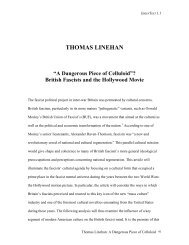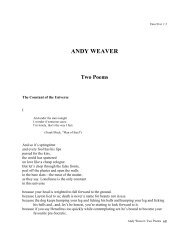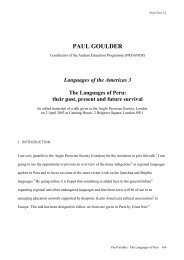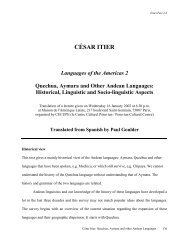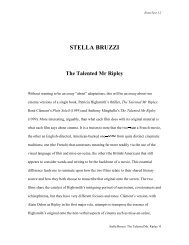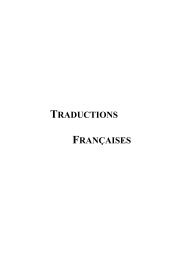Thomas Lamarre: An Introduction to Otaku Movement - Arts @ Brunel
Thomas Lamarre: An Introduction to Otaku Movement - Arts @ Brunel
Thomas Lamarre: An Introduction to Otaku Movement - Arts @ Brunel
Create successful ePaper yourself
Turn your PDF publications into a flip-book with our unique Google optimized e-Paper software.
overcoming. I am thinking especially of Azuma Hiroki’s idea of anime otaku as<br />
posthis<strong>to</strong>rical.<br />
EnterText 4.1<br />
A theory of emergence should spur thinking about how something new (say, the<br />
postmodern) emerges from densely interconnecting prior elements (of the modern) yet<br />
does not resemble those elements. The new is an experience and actualisation of what<br />
was virtual <strong>to</strong> a set of material conditions. The Gainax discourse, however, dispenses<br />
with correspondence and thus cannot think materiality or continuity. For Azuma, for<br />
instance, a simple break marks the movement from modernity <strong>to</strong> postmodernity (or<br />
alternatively, the posthis<strong>to</strong>rical). In a predictably modernist fashion, the his<strong>to</strong>rical break<br />
between modern and postmodern is re-inscribed as a geopolitical break: Western<br />
modernity versus Japanese postmodernity. Consequently, what began as a raid on<br />
hierarchies, subject positions and identities turns in<strong>to</strong> a defence of precisely these<br />
hierarchies, positions and identities.<br />
Let me give a last example that brings this discussion full circle. After attending<br />
the Otakon (<strong>Otaku</strong> convention) in the United States in 1995, Okada Toshio wrote of his<br />
encounter with American otaku. In his account, Okada demonstrates his profound<br />
fascination with the American otaku looking at Japan. Okada’s fascination with the gaze<br />
of the American otaku recalls Zizek’s discussion of the Western fascination with events<br />
in Eastern Europe in the late 1980s. “What fascinates the West,” Zizek speculates, “is the<br />
re-invention of democracy.” 28 In Eastern Europe, the West looks for its own origins, for<br />
the authentic experience of its democratic invention. Likewise, Okada’s fascination with<br />
American otaku appears as an attempt <strong>to</strong> re-invent anime and otaku, <strong>to</strong> re-discover their<br />
origins and identity. As Zizek suggests, the real object of fascination is the gaze, the<br />
<strong>Thomas</strong> <strong>Lamarre</strong>: <strong>Otaku</strong> <strong>Movement</strong> 178



